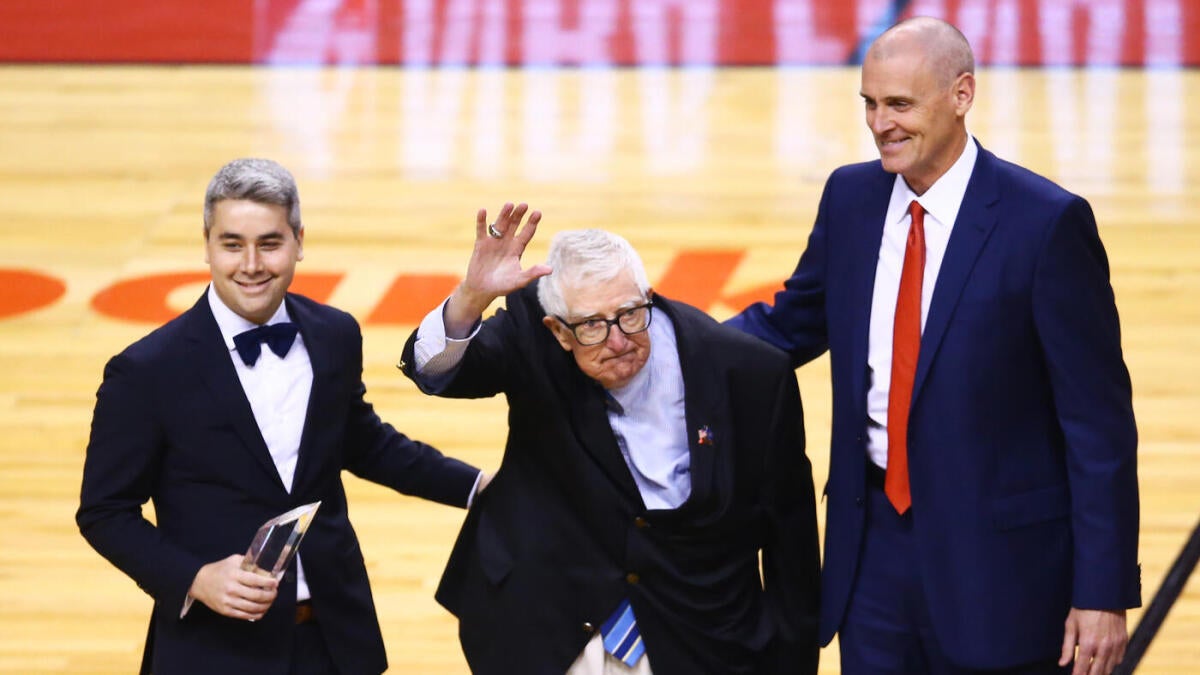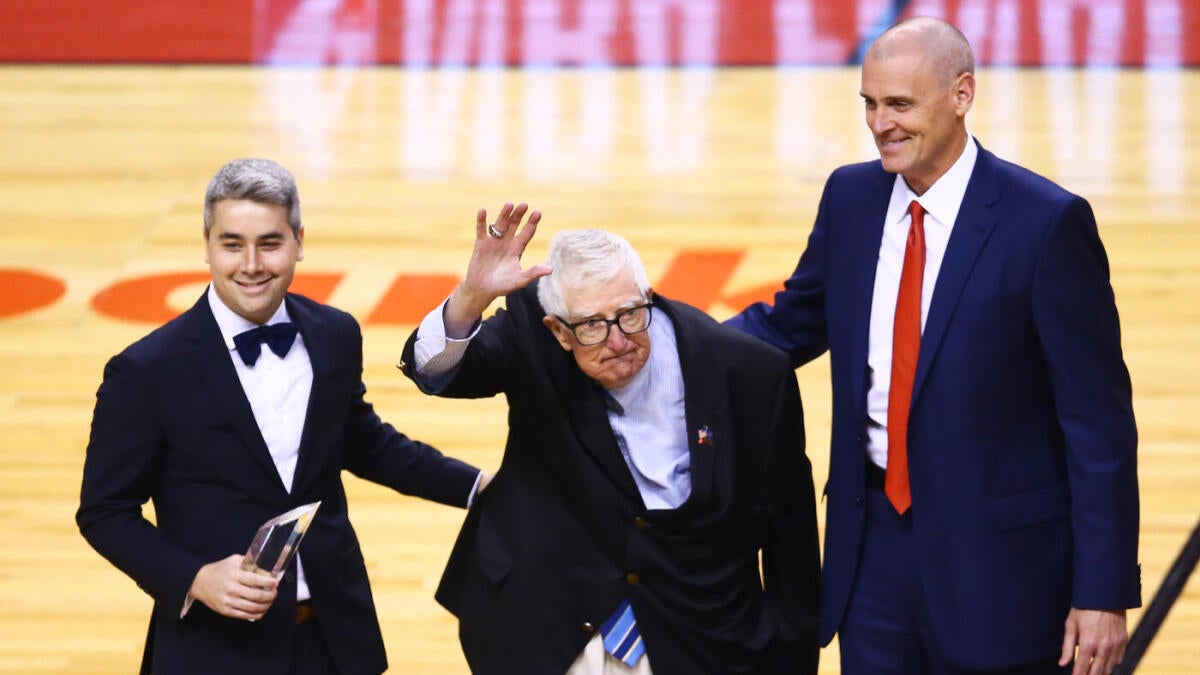Frank Layden’s passing at the age of 93 marks the end of an era for the Utah Jazz and the NBA. More than just a coach, Layden was an architect, a motivator, and a personality who left an indelible mark on the sport. His contributions extended far beyond the win-loss column, shaping the Utah Jazz franchise and endearing himself to fans and players alike. Layden’s legacy is a testament to his vision, leadership, and the profound impact he had on the game of basketball.
Building a Foundation: The Stockton and Malone Era
Layden’s most significant contribution was undoubtedly his role in drafting and developing the iconic duo of John Stockton and Karl Malone. In 1984, Layden, then the head coach and general manager of the Jazz, selected Stockton with the 16th overall pick. The following year, he added Malone to the roster with the 13th pick. This back-to-back acquisition of two future Hall of Famers transformed the Jazz from a struggling team into a perennial playoff contender.
The pairing of Stockton and Malone was a stroke of genius. Stockton’s unparalleled court vision, passing skills, and leadership perfectly complemented Malone’s relentless scoring ability, physicality, and work ethic. Layden recognized their potential and fostered an environment where they could thrive together. He instilled in them a sense of teamwork and dedication that became the hallmark of the Jazz for nearly two decades. Under Layden’s guidance, Stockton and Malone formed one of the most formidable duos in NBA history, setting numerous records and leading the Jazz to multiple deep playoff runs.
Layden’s ability to identify and nurture talent was not limited to Stockton and Malone. He had a keen eye for recognizing potential in players who might have been overlooked by other teams. His drafting strategy was not just about immediate success but about building a sustainable foundation for the franchise. This long-term vision was evident in the way he structured the roster, ensuring that the Jazz remained competitive year after year.
Beyond the Draft: Layden’s Coaching Prowess
While his drafting acumen is undeniable, Layden’s coaching ability should not be overlooked. He took the Jazz to their first playoff appearance in 1984 and was named NBA Coach of the Year that same season. His coaching style was characterized by a blend of discipline, humor, and genuine care for his players. He created a positive and supportive atmosphere that allowed his players to perform at their best.
Layden’s impact extended beyond the star players. He developed a system that maximized the strengths of his entire roster, turning role players into valuable contributors. His ability to motivate and connect with players from different backgrounds and skill levels was a key factor in the Jazz’s success during his tenure. Layden’s coaching philosophy was rooted in the belief that every player had a role to play, and he worked tirelessly to ensure that each member of the team felt valued and empowered.
One of Layden’s most notable coaching achievements was his ability to adapt to different situations. Whether it was adjusting to the strengths of opposing teams or making in-game decisions that could change the course of a game, Layden’s strategic mind was a significant asset to the Jazz. His coaching style was not just about X’s and O’s; it was about understanding the nuances of the game and the personalities of his players. This holistic approach to coaching set him apart from his peers and contributed to the Jazz’s sustained success.
From Coach to Executive: Continuing the Legacy
In 1988, Layden stepped down as head coach, handing the reins to his assistant, Jerry Sloan. However, he remained with the Jazz as president and general manager, continuing to shape the franchise from the front office. His transition was seamless, as he and Sloan shared a similar vision for the team and a strong working relationship.
As an executive, Layden continued to make shrewd personnel decisions, adding key pieces to complement Stockton and Malone. He understood the importance of building a deep and versatile roster, capable of competing with the best teams in the league. His leadership helped the Jazz reach the NBA Finals in 1997 and 1998, solidifying their place among the league’s elite. Layden’s ability to build a cohesive team culture was evident in the way the Jazz played. They were not just a collection of talented individuals; they were a unit that worked together seamlessly, both on and off the court.
Layden’s tenure as an executive was marked by his ability to make tough decisions. Whether it was trading players, signing free agents, or making coaching changes, he always had the best interests of the franchise at heart. His leadership style was characterized by a combination of decisiveness and empathy, which allowed him to navigate the complexities of team management with ease. Under his guidance, the Jazz became a model organization, known for their professionalism, work ethic, and commitment to excellence.
A Personality Larger Than Life
Beyond his basketball achievements, Layden was known for his larger-than-life personality and his ability to connect with people. He was a gifted storyteller, a witty speaker, and a genuine character who brought joy and laughter to everyone he met. His sense of humor was legendary, and he often used it to defuse tense situations and lighten the mood.
Layden’s charisma and warmth extended beyond the basketball court. He was actively involved in the Utah community, supporting various charitable causes and making a positive impact on the lives of countless individuals. He was a beloved figure in Salt Lake City, and his presence will be deeply missed. Layden’s ability to connect with people was not just a professional skill; it was a fundamental part of who he was. He had a unique ability to make everyone he met feel valued and appreciated, whether they were a star player, a front-office executive, or a fan.
One of Layden’s most enduring legacies is the way he represented the Utah Jazz both on and off the court. He was a proud ambassador for the franchise, and his passion for the team was infectious. His ability to inspire and motivate others was a key factor in the Jazz’s success, and his impact on the organization will be felt for generations to come.
The Enduring Impact
Frank Layden’s legacy extends far beyond the Utah Jazz. He exemplified the qualities of leadership, dedication, and integrity, serving as a role model for coaches, players, and executives throughout the NBA. His impact on the game of basketball is undeniable, and his contributions will be remembered for generations to come. He built a culture of excellence in Utah that continues to this day. He wasn’t just about basketball; he was about people, relationships, and community.
Layden’s influence can be seen in the way the Utah Jazz continue to operate today. The franchise’s commitment to excellence, community involvement, and player development are all a testament to the foundation he built. His legacy is not just about the records and accolades; it is about the lives he touched and the impact he had on the sport. Layden’s contributions to the game of basketball will be remembered and celebrated for years to come.
A Final Buzzer: Remembering a Legend
Frank Layden’s passing leaves a void in the hearts of those who knew him and admired his work. However, his legacy will endure through the countless lives he touched and the enduring impact he had on the Utah Jazz. He was more than just a coach or an executive; he was a mentor, a friend, and an inspiration to us all. His stories will continue to be told, his lessons remembered, and his spirit cherished. He truly was a beautiful human being, and his contributions to the game and the community will never be forgotten.
Layden’s impact on the Utah Jazz and the NBA as a whole is immeasurable. His ability to build a winning culture, develop talent, and connect with people set him apart from his peers. He was a visionary leader who understood the importance of both on-court success and off-court relationships. His legacy will continue to inspire future generations of coaches, players, and executives, ensuring that his impact on the game of basketball will never be forgotten.












